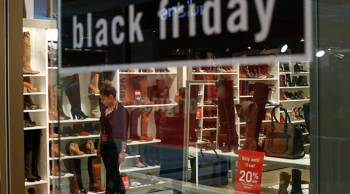Black Friday myths busted
Now that the Thanksgiving dishes are done and the leftover turkey’s been tucked away into Tupperware dishes, it’s time to talk about the next hallmark of the holiday season: shopping. This year ushered in a new era of consumer spending. For the first time, Black Friday became, well, Black Thursday Evening. Stores like Walmart and Toys-R-Us opened their doors just after Turkey Day dinner to cater to shoppers who wanted to get an even bigger jump on seasonal sales. But should we believe the hype over all these so-called retail deals? Richard Feinberg, a professor of consumer science and retailing at Purdue University, breaks down some of the biggest myths surrounding the holiday shopping season. His latest research is about the Black Friday shopping tradition.
Myth 1. Shoppers want to shop more; that’s why the stores are opening on Thanksgiving evening.
“I think most people will do what most people do — that is some of them will go shopping, some of them will watch football, some of them will take a nap. It’s just a matter of some or all,” says Feinberg. “People like to shop. I have never underestimated the attractiveness of a good sale to draw people out of their stupor and into the stores. So if the retailers are smart and have provided incredible offers to consumers, they will go into the store at 12 at night, 4 in the morning, 6 in the afternoon.”
Feinberg says shopping is like a hunting and gathering sport.
“It is as if they got up and went out and shot the biggest animal they could and came back and shared it with the family. The stories of great conquests are sort of family history and family lore and people love it,” he says. “It’s a social, fun event.”
Myth 2. Black Friday is the busiest shopping day of the year.
“It has not been the busiest shopping day of the year for many years. It is certainly busy. It is usually in the top five of revenue days, but it hasn’t been the top revenue day in quite a long time. Usually that day occurs on the Saturday before Christmas,” says Feinberg.
Feinberg says 50 percent of all shopping occurs in the last two weeks of the calendar year and that shoppers who go out during that time period are holding out because they believe they’ll get even better deals if they wait until the last minute.
Myth 3. You can get the best deals on Black Friday, especially if you score one of those “door-buster” deals — and you have a great chance at scoring the merchandise even once the deal is done.
“If you are willing to pitch your tent and get there hours before, you can get the 50 flat-screen TVs for $50,” says Feinberg. “The thing that intrigues me when I go out there is that even though consumers might know that only up to the 50th person gets the great deal, I like to talk to the person who is number 100 and I ask them why are they still there. And they have this incredible belief and hope that the retailer is going to come through or that the people in front of them really don’t want it or maybe the retailer has miscounted and they have 100 flat-screen TVs. It really is quite remarkable.”
Myth 4. Cyber Monday sales are a big contributor to the surge in consumer spending around the holidays.
Feinberg says Cyber Monday is really important to retailers, but it has decreased in its importance to consumers.
“Two years ago in 2010, there was a Cyber Monday where there was a very substantial, very significant uptick in Internet shopping. A lot of that had to do with the fact that Internet shopping was still relatively new to 75 percent of the American population and they had to wait to get to work to get access to broadband, which is the real key to shopping on the Internet,” says Feinberg. “Now we all know that we don’t have to do it that Monday, that shipping is free and that shipping will get the merchandise to us quickly. There is just no more large uptick on Cyber Monday anymore, so I would call that a myth.”
He adds, “I think the biggest thing that is surprising me is that we believe that 6 percent of all Internet sales will be done from an iPad or a similar tablet and that’s something that we didn’t see at all last year. We think that this trend is going to be geometrically increasing over the next couple of years.”
There’s a lot happening in the world. Through it all, Marketplace is here for you.
You rely on Marketplace to break down the world’s events and tell you how it affects you in a fact-based, approachable way. We rely on your financial support to keep making that possible.
Your donation today powers the independent journalism that you rely on. For just $5/month, you can help sustain Marketplace so we can keep reporting on the things that matter to you.


















